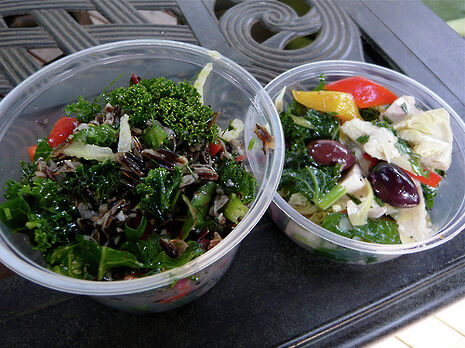Why Cambridge is organising a Sustainable Food Challenge
Sarah Foster explores the perks of food rationing and why it might help us avert a crisis

During the Second World War, Axis naval powers targeted merchant ships bringing essential supplies into the UK. Facing a worsening food shortage, and aiming to distribute the available resources equitably, the Government implemented a rationing scheme for foodstuffs like meat, eggs, dairy and sugar. As a matter of patriotism and national urgency, citizens were urged not to waste food and to ’Dig for Victory’ by planting allotments or gardens to supplement their diets with home grown produce.
“Walking into a modern grocery store, the idea of food scarcity might seem profoundly distant”
Many at the time feared that a diet restricting meat and dairy would leave the population enfeebled and demoralised. The question was critical: a starving and weakened populace would surely collapse under the challenges of war. In 1939, with the prospect of rationing looming ever greater, Cambridge physiologists Elsie Widdowson and Robert McCance headed to the Lake District to test the physiological effects of a minimal diet based entirely on local food—a diet even more Spartan than the rationed diets civilians would soon face. They were in excellent health after their three months, which also involved vigorous exercise. Food rationing began in 1940. Not only were people able to maintain their strength on the rationed diet, but increases in protein and vitamin intake during rationing have even been credited with a decrease in infant mortality rates and an increase in life expectancy.
Walking into a modern grocery store, brimming with exotic produce from all corners of the earth, the idea of food scarcity might seem profoundly distant. Nonetheless, we are currently in the midst of a food crisis – vastly less visible and much slower moving than torpedoes hurtling towards supply ships on the Atlantic – but ultimately perhaps just as existentially threatening. The current crisis is global, and highly complex, but the key points are simple: the world’s population and concomitant demand for food is growing and agricultural systems as currently managed may not be able to cope indefinitely. And from deforestation to massive methane emissions from cattle ranching, the way we grow, transport and consume food is a leading contributor to biodiversity losses and greenhouse gas emissions.
The effects of global warming then place further strain on agricultural systems. To make matters worse, a lot of precious food goes to waste. In 2016, it is estimated that in the UK we threw away £2.6bn of fresh fruit and veggies alone! Some fear that a failure to substantially change our food systems could drive the human population towards a Malthusian catastrophe.
The picture may seem bleak, but the example of WWII rationing shows that if we stalwartly confront our current food crisis and acknowledge its immediacy, it is possible to make meaningful changes in our diets. We could potentially learn a lot – and maybe glean some health benefits as well – from exploring a culture that passionately discourages food waste and encourages a locally sourced, plant-focused diet.
To encourage a different way of thinking about food and explore how rationing might help us understand our current food crisis, Cambridge Sustainable Food is launching a WWII Rationing Challenge for one month starting June 20th, with a launch event on June 12th. (You can find more information at cambridgesustainablefood.org). The challenge asks participants to restrict their intake of sugar, eggs, meat and other foods that were rationed during WWII. These foods – especially meat and dairy products – are also some of those which contribute most to the severe environmental strain caused by our current agricultural systems according to a report published in the American Journal of Clinical Nutrition. If you’re not in Cambridge after term ends, you can still participate. Curating your Victory Garden and figuring out how to prepare fennel and kohlrabi will also provide a nice occupation for the summer holiday!
 News / Clare Hall spent over £500k opposing busway 24 December 2025
News / Clare Hall spent over £500k opposing busway 24 December 2025 News / Caius mourns its tree-mendous loss23 December 2025
News / Caius mourns its tree-mendous loss23 December 2025 Comment / The ‘class’ of Cambridge24 December 2025
Comment / The ‘class’ of Cambridge24 December 2025 Comment / Yes, I’m brown – but I have more important things to say22 December 2025
Comment / Yes, I’m brown – but I have more important things to say22 December 2025 Interviews / Politics, your own way: Tilly Middlehurst on speaking out21 December 2025
Interviews / Politics, your own way: Tilly Middlehurst on speaking out21 December 2025









